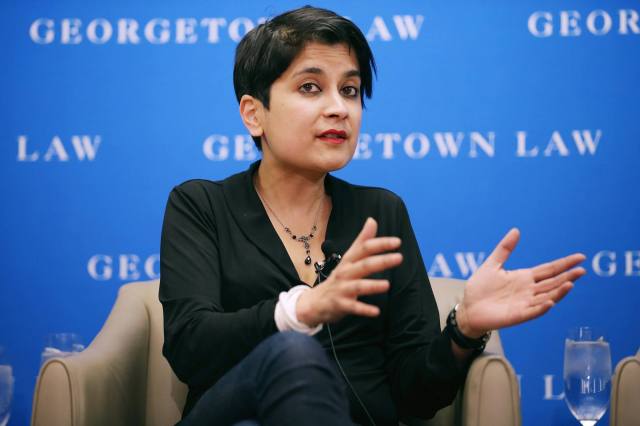
Democracy is more than mere majoritarianism, this much we are told. Though the majority of citizens must have the lead say in who governs, the minority must have a minimum level of protection from the wishes of that majority. That is why in a true democracy the wishes of the majority must be qualified by the presence of human rights and the rule of law.
Following this sort of reasoning, the Shadow Attorney General and former Liberty director, Shami Chakrabarti, argued on the BBC’s Today programme this week that the right to an abortion should be imposed by law upon Northern Ireland – even if the majority of its citizens do not want it. The right to an abortion is a fundamental human right and thus it even supersedes the wishes of the majority – that was basically her line, I believe, though she was careful not to spell it out quite so baldly.
This is not a discussion on abortion, my interest is simply in the way the appeal to human rights can be used to trump the wishes of the majority. And I worry that what was originally intended as a protection against the tyranny of the majority can be used as a means of imposing or maintaining the dominance of a certain worldview, even against the wishes of the population concerned. That is, it becomes a way of imposing a particular slate of (typically liberal) values without the need to persuade people to vote for them.
Writing in the Human Rights Law Journal in 2016, Hurst Hammun, Professor of International Law at Tuft University, offered the following warning:
“Unless there is a conscious attempt to return to the principles of consensus and universality, the increasingly strident calls from European and other ‘Western’ human rights activists for adherence to the contemporary liberal European construct of society is likely to create a backlash in the rest of the world. This tendency is concurrently exacerbated by activists who see an expansive concept of ‘rights’ as the primary means to effect domestic social and political change.”
Imagine, for instance, that the language of human rights has been extended to the unborn child, as some argue it should be, and used as a means of nullifying the wishes of the majority of voters in the recent Ireland referendum. There would rightly have been a massive outcry. So why does the Shadow Attorney General think it acceptable in the case of Northern Ireland? Because, of course, she believes that human rights, when properly understood, map onto her own political values, and are a means of achieving them.
Perhaps I should come clean about my wider nervousness about the very notion of human rights. Much that has been achieved by an appeal to human rights has been laudable. But I remain cautious about the inherent individualism of human rights, that a right is regarded as the property of individual human beings and as the foundational basis for this whole moral philosophy. Cautious because, for most of human history, ethical consciousness has been structured around a sense of corporate responsibility – of the ‘we’ coming before the ‘I’.
But in the ideology of human rights, the rest of the world and all other people are regarded as satellites to the solitary individual who is demanding their ‘rights’ as a form of moral self-assertion. And as self-assertion knows no limits, so the sense of what rights one is entitled to inevitably grows and grows. This is the mission creep of human rights language. “The defence of human rights has reached such extremes as to make society as a whole defenceless,” wrote Aleksandr Solzhenitsyn. And that was way back in 1978. Since then human rights have demanded ever greater jurisdiction.
Morally speaking, human rights as conceived by the Universal Declaration of Human Rights are a relatively new thing. That declaration has its seventieth birthday this December. And in this country, the Human Rights Act is still a teenager. So it is still way too soon to give a full account of its successes and failures. There are those, especially in Muslim countries, who regard human rights as a means of ushering in western liberal values against the will of the majority. They argue that the expansion of human rights language has coincided historically with the liberal hegemony in the West and that it fails to respect other moral systems like Islam – or even Judaism and Christianity with their communitarian moral consciousness.
But the doctrine of human rights was substantially the creation of seventeenth century Christian political theology. It was John Locke that argued that human beings had been granted their rights by God and as protection against tyrannical government. “All men … are endowed by their Creator with certain unalienable Rights” as the Declaration of Independence put it, drawing on Locke. And the protection of minorities – women, children, ethnic minorities, homosexuals – against the power and prejudice of the majority has been at the heart of its moral successes. But no one considered that the language of rights could itself become a form of tyranny – a means of imposing liberal values on the majority of society against their will.
The global experiment in human rights has a long way to go. There is much to applaud. But as western societies begin to whisper about the possibility of a post-liberal future, the whole basis of human rights begins to look more exposed than ever before. And without (Locke’s) God to underwrite its claims to an unbreakable connection between morality and the human individual, it becomes ever plainer that human rights only exist because we believe in them.










Join the discussion
Join like minded readers that support our journalism by becoming a paid subscriber
To join the discussion in the comments, become a paid subscriber.
Join like minded readers that support our journalism, read unlimited articles and enjoy other subscriber-only benefits.
Subscribe